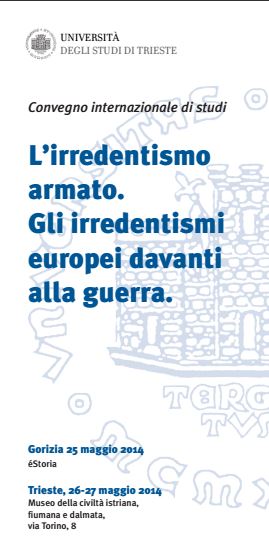 Espaces frontaliers : Zones de contact / zones de conflit ?
Espaces frontaliers : Zones de contact / zones de conflit ?
3e journées d’études « Frontières »
Université de Liège (Belgique), Jeudi et vendredi 25 et 26 avril 2013
Paper submissions (provisional title and a 20-lines summary) should be sent before September 15, 2012
Border Spaces: Areas of contacts / Areas of conflicts? Study Day “Borders” – University of Liege (Belgium) – April 25-26, 2013 (Thursday-Friday)
«The border, wrote Daniel Nordman, is a notion, not an object, a flabby or sluggish thing. It has no real meaning without the words, figurations, concepts used to describe it”. In other words, nothing but imagination, oratory art, military strategy, human ambitions and feelings are filling it with sense and signification, which are in turn giving it some existence. People, who through centuries thought about, explained and reinvented borders, probably exerted a greater influence on space perception and organization than those who marked and delimitated them, should the space to investigate be in the political, religious, social and economical, or cultural areas. However, the field or study-cubicle actors, who imagined territorial borders before giving them concrete delimitations, had, for the most part, never to experience them in their daily life. Their purely theoretical relation with “borders” must be supplemented by the testimony of those who were directly involved or challenged by their fixation. The “border areas” thus created must attract the attention of researchers on account of their differences with the core and central areas, and also as, with the passing of time, they reveal themselves as zones of contact and exchange but also as sources of conflicts.
The Interuniversity Study Days “Borders” organized by and at the Liege University have as main goal to provide an annual report on the state and advancement of research on the notion of frontier, border and dividing lines in a diachronic and multidisciplinary perspective.
Starting with the concept itself (Frontières fixes et mouvantes, espaces, temps imaginaires, April 2011), they were devoted in May 2012 to the historical context of their creation and to the circumstances making their tracing evolve (Penser la frontière entre Meuse et Rhin). The young researchers involved in the project now intend to turn their attention to the men and women who lived or are still living on the border fringes of a fixed territory, to those who guarded, violated or trespassed limits (of all sorts). How did they feel, react or simply bow in submission to the changes in border-tracing or to the way in which the changes were presented to them or forced upon them? Two study days will thus be devoted to an approach of “Border”, seen as an area of encounters, of material and cultural exchanges, of political and social regroupings or mixing, or, to the contrary, as an area of political, economical , military and cultural confrontations and ruptures.
All researchers in Human Sciences, in the broad sense (History, History of Art, Politics and Government, Philology, Linguistics, Ethnology, Sociology, Law, or more) interested in establishing a fertile interdisciplinary dialogue are thus cordially invited to take part in the meeting, which will be held at Liege University (Belgium) on April 25-26, 2013 (ThursdayFriday).
The languages used during the proceedings will be French, English and German.
Paper submissions (provisional title and a 20-lines summary) should be sent before September 15, 2012, to Anthony.Dignef@ulg.ac.be and / or christophe.bechet@ulg.ac.be













